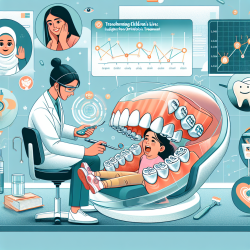Introduction
As a dedicated practitioner in the field of speech-language pathology, you are likely aware of the multifaceted challenges faced by children with Autism Spectrum Disorder (ASD). One area that often requires our attention is oral health, a critical aspect of overall well-being that can be overlooked. The recent study titled "Oral Health Assessment of Children with Autism Spectrum Disorder in Special Schools" provides valuable insights into the oral health challenges and needs of children with ASD. By integrating the findings of this study into your practice, you can significantly enhance the outcomes for these children.
Understanding the Study
The study conducted a cross-sectional analysis of 142 children with autism attending special schools in Mumbai, India. It aimed to assess the prevalence of oral health issues such as dental plaque, gingivitis, caries, and self-injurious habits among these children. The findings revealed that children with primary and mixed dentition had a higher incidence of dental caries compared to those with permanent dentition. Despite these challenges, the overall oral hygiene was relatively good, with a mean OHI-S score of 0.88 ± 0.79.
Key Findings and Implications
Several critical findings emerged from the study:
- Children with primary and mixed dentition exhibited a higher incidence of dental caries.
- Good oral hygiene was observed, indicating effective preventive measures at home and school.
- Common issues included traumatic dental injuries, bruxism, and self-injurious habits.
These findings underscore the importance of preventive dental care and the need for practitioners to focus on early intervention strategies. By understanding the unique challenges faced by children with ASD, you can tailor your approach to better meet their needs.
Practical Steps for Practitioners
To enhance your practice and improve outcomes for children with ASD, consider the following steps:
- Implement Preventive Care: Emphasize the importance of regular dental check-ups and preventive care. Educate parents and caregivers on effective oral hygiene practices tailored to children with ASD.
- Behavioral Strategies: Utilize behavioral management techniques such as the "Tell-Show-Feel-Do" method to help children become more comfortable with dental procedures.
- Collaborate with Dental Professionals: Work closely with pediatric dentists to develop comprehensive care plans that address the specific needs of children with ASD.
- Educate and Support Families: Provide resources and support to families, helping them understand the importance of oral health and how to overcome barriers to care.
Encouraging Further Research
While this study provides valuable insights, it also highlights the need for further research. As practitioners, we must advocate for more comprehensive studies that explore the oral health challenges faced by children with ASD across different regions and settings. By contributing to this body of knowledge, we can continue to improve the quality of care provided to these children.
Conclusion
The oral health of children with ASD is a crucial aspect of their overall well-being. By implementing the findings of this study and advocating for further research, you can play a pivotal role in improving the outcomes for these children. Together, we can create a brighter future for children with ASD by ensuring they receive the comprehensive care they deserve.
To read the original research paper, please follow this link: Oral Health Assessment of Children with Autism Spectrum Disorder in Special Schools.










